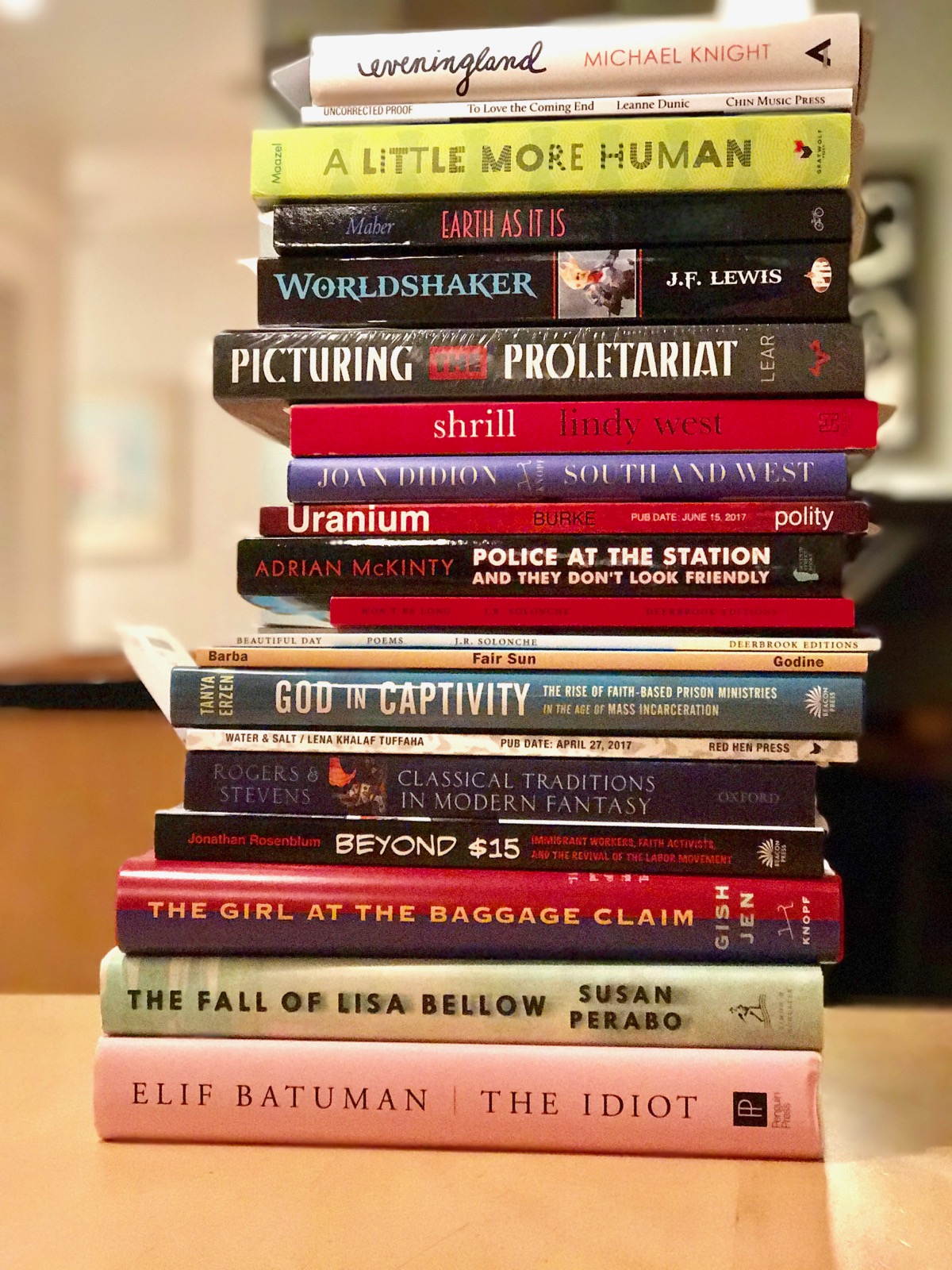The best way to announce the discovery of new planets: poetry
Like everyone else, you probably grew a little bit misty at the news that NASA discovered seven Earth-sized planets some 40 light years away from us. It's wondrous news, by which I mean it inspires wonder in us.
But one of the neater and under-covered aspects of this revelation is that astronomer Sean Raymond, one of the co-authors of the report about the planets, announced the discovery with a long poem. You can find the poem, "Ode to 7 Orbs," on Raymond's site. A sampling:
This new star with planets is called TRAPPIST-1
It’s not a star that is at all like the Sun
It’s much much much smaller, and also less hot
Two thousand times fainter. (Now that is a lot).
An “ultracool dwarf” star they call it. And hey,
It’s just about 40-odd light years away.
The planets have letters for names. Now, you see,
From outside to in it’s h, g, f, e, d,
And, yes, as you guessed, after that, c and b
(The first one’s called b. There is no planet a.
The “a” is reserved for the star, by the way).
Okay, look: it's not great poetry. But it is absolutely adorable that a scientist is so excited about a discovery the he decided to celebrate it with an epic explanatory poem. The sheer exuberance of it is deeply moving.
Where can you get Maged Zaher's new book?
This week, I reviewed Maged Zaher's big new career-spanning collection, Opting Out. It's published by local press Chatwin Books, which is based out of Pioneer Square used bookstore Arundel Books.
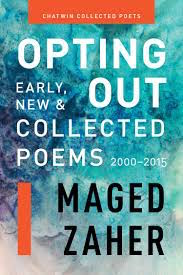
If you've tried to order Zaher's new book online, you've probably noticed that it's not available. I talked with Chatwin/Arundel owner Phil Bevis about why that is. Basically, Arundel Books had to suddenly move their store to a newer, more favorable location. (Previously it was facing Occidental Park. Now it's at 212 1st Ave S.) But because the move consumed so much of Arundel/Chatwin's time and resources, the book has been delayed.
Bevis says the new publication date for Opting Out is April 7th. Any books you pre-order through IndieBound or http://www.chatwinbooks.com or any other online retailer will be fulfilled then. But if you can't wait to get your hands on a copy — and you should be eager to get your hands on a copy; it's an exemplary work — Bevis says "a limited number of pre-release copies are available now at Arundel Books' new location." So the only place in the world to buy Maged Zaher's new book right now is in Pioneer Square. Stop by, check out Arundel Books, and get a super-rare pre-pub edition.
Thursday Comics Hangover: Can you top this?
The eighth issue of Nick Spencer and Steve Lieber's crime comic The Fix was published yesterday, and this series keeps getting better. Ostensibly the story of two crooked Los Angeles cops and a drug-sniffing dog named Pretzels, The Fix keeps expanding to absorb more and more characters; what began as a character-focused heist story quickly (and effortlessly) became a huge ensemble piece.
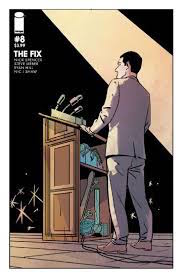
Note those words: "expanding," "huge." This isn't the vocabulary you usually use to describe an Elmore Leonard riff. What wasn't apparent in the clever first issue of The Fix is that it's a shaggy dog story, a dirty-joke-riddled tall tale whose stakes are raised with every chapter. The reveal in the eighth issue is the biggest yet, and it leaves me wondering if eventually the threats in the book will have to transcend the semi-realistic sleazy LA noir genre to become intergalactic in scope.
Spencer's script is wry and character-driven. One of the two leads prays to God for a favor and apologizes for being out of touch for so long by saying "in Catholic school, they made it pretty clear it was you or masturbation, and I just--I got stuck with the home team, you know?" That is a lot of information about the character concealed within a gag that we didn't previously have before. A rule of thumb for reading a crime story: when a joke advances the plot, that's good writing.
From the wordless sequence depicting Pretzel's origin story that opens the issue to a series of pratfalls as a character tries to climb a fence that's too tall for him, Lieber's art is perfect for this kind of comedy. His figures and facial expressions aren't exaggerated in the least — he plays the characters straight, which makes the physical comedy and the quick stabs in the script land with even more force.
I have to wonder if The Fix might read better in collected trade editions than in single issues: while each issue feels like a contained chapter in a story, it could be easier to retain a sense of continuity when you read a bunch of chapters all at once. But no matter how you take it in, The Fix is a must-read: a funny, nasty, character-driven crime drama that keeps outdoing itself with every twist.
Book News Roundup: With today's special guest stars, Walt Whitman and L. Ron Hubbard
The Seattle Public Library has announced that they've made public a dataset which "includes a count of checkouts by month of both physical and digital items, and spans from 2005 to the present." You can find that list here.
The Nebula Awards ballot has been announced. We couldn't be more pleased to announce that Seattle Review of Books contributor Nisi Shawl's novel Everfair is on the ballot for best novel. We're bummed to see that Seattle author Cat Rambo's short work "Red in Tooth and Cog" was bumped from the novelette category because it's a little too short to meet the word count.
A novel by Walt Whitman has been discovered. (To quibble: At 36,000 words, it's more of a novella than a novel.) It sounds positively Dickensian:
...Life and Adventures of Jack Engle, is a first-person narrative following an orphan on his journey through New York, which included a full cast of colorful, diabolical money-and-power-hungry characters, as well as “virtuous Quakers” and a “sultry Spanish dancer.” Researchers believe that the work was never reprinted after it was published anonymously in the New York–area newspaper The Sunday Dispatch.
You should apply to be the Mall of America's writer-in-residence.
Sometimes you just need a title to know that you should read something: "Xenu’s Paradox: The Fiction of L. Ron Hubbard and the Making of Scientology
Your Week in Readings: The best literary events from February 22nd - February 28th
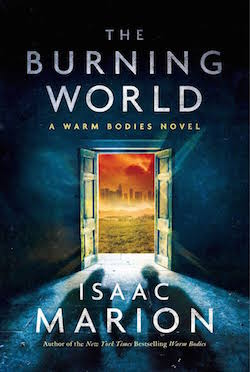
Wednesday February 22nd: The Burning World Reading
Hardcore zombie purists may not love Isaac Marion's young adult novel Warm Bodies — zombies who can talk? Sacrilege! — but everyone else seems to have fallen pretty hard. In the new sequel, the semi-alive protagonist learns how to reconnect with the human race and come to terms with his past. Bellevue Library, 1111, 110th Ave, 425-450-1765, http://kcls.org. All ages. 7 p.m.Thursday February 23rd: Faggots in the Stacks
Likely due to its controversial name, the listing for this book group warns that “this event is not officially sponsored or endorsed by the Seattle Public Library.” Officially endorsed or not, it’s a must-attend discussion of Martin Duberman’s Hold Tight Gently, a true story of two artists during the AIDS epidemic. Capitol Hill Library, 425 Harvard Ave. E., 684-4715, http://wwwspl.org/. Free. All ages. 6 p.m.Friday February 24th: It Was Written: Poetry Inspired by Hip-Hop Launch Party
See our Event of the Week column for more details. Vermillion Art Gallery and Bar, 1508 11th Ave., 709-9797, http://vermillionseattle.com. Free. 21+. 7 p.m.Saturday February 25th: Adventures in Property Management Book Launch Party
Seattle author Chelsea Werner-Jatzke’s new book, Adventures in Property Management, is a chapbook from Sibling Rivalry Press. It’s a collection of (somewhat true) micro-fiction about a single apartment building. Tonight’s party features a reading from Werner-Jatzke along with guest appearances by local writers and a multimedia artist. Hugo House, 1021 Columbia St., 322-7030, http://hugohouse.org.. Free. All ages. 7 p.m.
Sunday February 26th: Laughing All the Way to the Mosque Reading
Zarqa Nawaz created a Canadian sitcom called Little Mosque on the Prairie. This afternoon, she debuts her new comedic memoir about being a Pakistani-Canadian experience, Laughing All the Way to the Mosque: The Misadventures of a Muslim Woman.Nawaz is in town for the Search for Meaning festival at Seattle University. Elliott Bay Book Company, 1521 10th Ave, 624-6600, http://elliottbaybook.com . Free. All ages. 3 p.m.Monday February 27th: Gaslighting in Government
Two UW professors (David Domke, a communications expert, and Christopher Sebastian Parker, who specializes in political science) will talk with a mental health professional to discuss the idea of gaslighting — the imposing of a false reality upon an innocent victim who gradually accepts the fiction as real— and how that relates to the Trump administration. Town Hall Seattle, 1119 8th Ave., 652-4255, http://townhallseattle.org. $5. All ages. 7:30 p.m.Tuesday February 28th: Bridges Not Walls
Many Seattleites will be attending the reading from George Saunders for his debut novel Lincoln in the Bardo at Town Hall tonight. But this event, which features Seattle authors like Donna Miscola and Kathleen Alcalá, deserves your attention as well. This event is designed to examine who deserves a platform, and who you’re silencing when you speak. Seems appropriate for the time. Juan Alonso-Rodriguez Gallery, 206 S. Washington St. #104, 390-4882, http://www.ravenchronicles.org/bridges-not-walls. Free. All ages. 7 p.Literary Event of the Week: It Was Written book launch at Vermillion

Seems impossible in 2017, but you can still find people online who proudly announce that they don’t listen to “rap-crap.” Likewise, plenty of dudes will eagerly announce that they like all kinds of music except for country and hip-hop. Those are both statements that carry a lot of unspoken weight: if you dismiss country music and hip-hop with one broad shrug, you are basically saying “poor people make me uncomfortable and I prize comfort over everything else, including intellectual curiosity.” And dismissing an entire musical genre as garbage, especially when that medium was exclusively created by and largely fostered by young black artists, well — all together now — that’s racist.
Hip-hop is the fruit of a long, intertwined series of traditions, both musical and literary. The musical aspect is a fascinating act of reverse colonization, though which young musicians built entire cathedrals of rhythm inside tiny, repeating beats carved out of pop records. They dug into old records and found a universe of new songs there, hiding in the lines of a record. But the lyrical tradition goes back to times before record players ever existed—back to the call and response of churches, to plantations and ships crossing the Atlantic and further still. It is indisputably poetry. (For more information about the history of hip-hop, I can’t recommend Jeff Chang’s excellent 2005 book Can’t Stop Won’t Stop: A History of the Hip-Hop Generation enough. It’s exactly the loving, intellectual tribute that the genre needed.)
Small Seattle publisher Minor Arcana Press (slogan: “Good books for weird people”) is adding another level to the conversation between hip-hop and poetry with a new anthology titled It Was Written: Poetry Inspired by Hip-Hop. The book invites over four dozen poets to respond to hip-hop songs through verse, to open a conversation with artists they admire or struggle with (or both.) And then, in a genius move, It Was Written then flips the script by including “over 30 writing prompts* urging the reader to become a writer and join the conversation.
This Friday, Minor Arcana invites local poets including Robert Lashley and Brian McGuigan to help launch It Was Written with a book party at Vermillion. They’ll be joined by other readers including Quenton Baker, a poet who got his start as a hip-hop artist. Because the party would feel really weird without some form of live music, self-described “beat scientist” WD4D will be running the turntables at the show.
No, I’m not saying that your grandmother could become the world’s biggest Nas fan. Hip-hop is not going to be everyone’s favorite kind of music. But I am saying that hip-hop is alive and vital and inspiring conversations in a way that other kinds of art simply isn’t. By engaging with hip-hop head-on, Minor Arcana and its poets are contributing their own chapter to a history that is older than America as we know it. They’re keeping the conversation going.
Support Gay City!
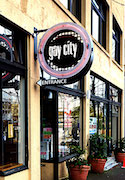
Well, you rendered Northwest Associated Arts' sponsorship useless by buying all the tickets to their Neil Gaiman event, so they kindly donated this week's sponsorship to a good cause: Gay City.
Did you know that Gay City has a 7,000 volume library centered around LGBT interest and focus? Please consider donating to Gay City to support their important mandate for supporting LGBT culture and health in our city.
Sponsors like Northwest Associated Arts make the Seattle Review of Books possible. Did you know you could sponsor us, as well? Get your stories, or novel, or event in front of our passionate audience. Take a glance at our sponsorship information page for dates and details.
The Seattle globalist
Published February 21, 2017, at 12:09pm
Maged Zaher’s new book is a biography of sex, software, and worldwide revolution.
In light of yesterday's news that Simon & Schuster canceled Milo Yiannopoulos's book deal, Ron Hogan wrote a great Medium post explaining how book deals work. Short answer: Yiannopoulos likely made a lot of money out of this deal, free and clear. Go read the whole post.
SISTAHS - How We Got Ovah
"If Black English isn't a language,
then tell me what it is."
— James Baldwin (1934 - 1989)Sunday Morning
Sun's up
they say it's Sunday
come to us againBacon and egg smells
float over from Master's House
somebody's smoking cigars
maybe two somebodiesCigars they come here
by big riverboats
breakfast china dishes
they come too
and ice for fancy get-togethersCost lots of money
Last Sunday
they traded Jubilee
my grownup cousin
and Vashti my little sister
to pay for all the cigars
and all the breakfast china
but not for all the iceThey said too much
had melted on the way(for Octavia Butler)
Fingers
I want to see fingers/ fingers flying across piano
keys/ fingers strolling over black notes & blue
notes & sharp notes & flat notes & get up in
the morning notes/ fingers/ I want to see
BB King fingers hitting Lucille's guitar stringsUM ain't that some stuff/ Nina Simone Queen
of Soul fingers backing up The King of Love/
Martin Luther King fingers & hands pounding
on America's pulpit/ yesterday & now I Have
A Dream fingers/ fingers/ my great grandfather's
CC Rider fingers taking the Bible to Black folks
using their fingers to read/ my grandfather's
chef fingers shaping fancy pastry & roasting
duck & making people lick their fingersUM ain't that some stuff/ fingers/ my mother's
fingers/ my father's fingers/ all theses fingers
pushing me into circles of light/ my fingers/
this poemMirror Woman
Mirror, mirror on the wall,
who is the fairest of them all?
— Brothers Grimm, "Snow White"Let me tell you something.
I'm a woman of African descent
and that isn't just something.
You hear me.
It is some thing.
Yes! I am a woman of African descent.In a public library restroom
caught a sistah standing behind me
staring in the mirror at me.
"Are you mixed?" she says
at the back of my head.I say to the mirror "What!"
as in — What's wrong with you, Sistah!
"Are you mixed?" she says
one more time
giving me the once-over
as though she'd paid admission
and was entitled.Now I shake my hands dry.
I say to the sistah in the mirror,
"What!" as in
What manners did yo Mama
not teach you.She blinks hard like I'm some
kind of puzzle. "Mixed," she says,
"You know, as in mixed!"
"No No No!" I say."I am not mixed. I am nobody's
mixed anything!" I hear my voice
rising . "I am a woman of African
descent. Just like you!""Passing," she says interrupting.
"Do you ever think of passing?"
"Why?" I say without thinking. "Why would
a woman of African descent want to pass?""Easier," she says. "Life would be easier,"
she says. "Easier for what?" I almost say.
"The Price of the ticket," I say. "That's
what James Baldwin would say.""Who's he?" she says.
"Pass. You could do it."I want to hug her. Yes. Maybe I
even want to give her my skin.I move away
leaving her free to talk with that
other woman in the mirror.Say My Name
Say my name please.
Please say my name. Look at me when you say
my name. My name. You put it in a bag and
tied it with wires at the top where the paper, the
parchment was peeling in little threads. Threads
like my mother used when she hemmed my
dress. Gauze. Gauze. Strips of gauze covered
with mericrome and witchhazel and in the
medicine cabinet with all those little bottles —
amber, blue-cobalt blue — where she put my
name before she closed the door, the mirror.Wiped it clean.
I wrote my name in the steam on the mirror. She
wiped it clean, took my name away, this mirror
woman who polished what was left of the
light, the long could-be-singing nights with my
name. Here in the twilight of the sighs and long
meter hymns and someone breathing long and
low and heavy in the dark of my name. I hear it
low and sweet so sweet and hear, yes, the carry-
me-back-words of my name riding in a boat
with the gold leaf of its name Muerte — Muerte.And on its sides,
this ship with its polished wooden sides, this
wooden carved maiden leading it in its name,
this wooden carving with its long green hair,
green sea waves... carry-me-back-waves/ carry
me back... Its rough lips wooden and pouting
and half open, taking in the blue-green ocean
waves and the foam, lips parted/ bared to the
blue wind as if to say my name, to sing it into
the blue-black wind.Amazing Grace.
And who was that woman! Say it. Spit it Out.
Weave if from long colored banners from soft —
as spring wool, from cotton, yes cotton. Cotton
mouth. Poison. sssssssssssss. Please. Please say
my name. Please.Look at me.
So it turns out that Simon & Schuster's "free speech" defense of Yiannopoulos was total bullshit. When people complained about Yiannopoulos's racism and sexim, Simon & Schuster was high on the free speech horse. But now that video has emerged of Yiannopoulos exercising his free speech about pedophilia, Simon & Schuster runs away.
In other words, it was only when Yiannopoulos started spouting unmarketable speech that Simon & Schuster got queasy. This was never about free speech. This was always about money.
Tess Townsend writes at ReCode:
Two University of Washington professors are teaching a course to help students “think critically about the data and models that constitute evidence in the social and natural sciences,” according to the introduction to the course.
The 160-seat seminar, titled “Calling Bullshit in the Age of Big Data,” begins in late March and continues for roughly 10 weeks. Members of the general public can follow the course syllabus, including readings and recordings of lectures, at the course’s website.
Here is the Calling Bullshit website, which includes a syllabus, tools, and case studies. The FAQ promises to post videos of the lectures in the near future. I hope professors Carl Bergstrom and Jevin West keep this project going beyond just the one class; we can use as many bullshit-callers as possible in the world right now.
Exit Interview: Michelle Peñaloza says goodbye to Seattle
Michelle Peñaloza has lived in Seattle for almost exactly four years. In that time, the poet and essayist — she’s the author of the chapbooks landscape/heartbreak and Last Night I Dreamt of Volcanoes — has become a ubiquitous Seattle literary figure, both on stage and in audiences at literary events throughout the calendar year. Peñaloza's announcement that she will be leaving town at the end of February sent a shock through the community. She’s more than just a sharp observer and a deft and graceful poet — though she is that, too. She’s become an integral part of the literary community’s support system. It’s hard to imagine the city without her.
Peñaloza made time to talk over the phone in the middle of a very busy transitional week in her life. What follows is an edited transcript of our conversation.
Thank you for making this time for our readers. I really appreciate it; I know it's a very busy time for you. I guess, first of all, I am wondering if you'd be willing to talk about where you're going and why.
I won't get too specific, but basically I'm moving for love, so that my partner and I can be together full-time in California. That's reason, I think, to leave.
So say somebody in California asks you what the literary culture in Seattle is like, and what your experience has been. What do you think you'd say to them?
It's a very vibrant scene. I would say that I was very sad to leave it and that I've loved my time in Seattle. I've met so many incredible people, and I feel like I've been lucky to have such a great amount of support. Not that I don't work hard or anything, but I feel like I've been very supported as a writer in Seattle. I feel like I've had a lot of opportunities with Jack Straw and the Made at Hugo House Fellowship, and teaching at Hugo House. I was a visiting writer at Seattle U. I would say that my personal experience has been a very good one.
So you would recommend to Seattle to another writer who's asking your opinion about whether she should move here?
Yeah, it's the best city that I've ever lived in as a writer. Granted, part of that is where I am in my writing life, too. I finished grad school maybe two years before I moved here, so I was in a different spot than I'd ever been in my writing life. I think those just dovetailed in a very fortunate way for me in Seattle.
Also, I feel like it's big enough that there's lots of stuff going on. In fact, sometimes too much stuff going on. I feel like there's some months in Seattle that are just insane — like, October is always crazy because people have been coming down from summer. There's just reading upon reading upon readings.
I would say, I guess, if you're looking not to be too busy, I don't know if Seattle's the place for you.
Is there anything that you think that Seattle could do to be more supportive for writers?
One of the things I noticed when I first moved here, and then I sort of became part of that same pattern that I had noticed, is that a lot of Seattle readings series ask the same people to read. You'll see someone who's reading everywhere all the time for like a year. I feel like maybe spreading it around more, doing a better job of thinking like, "Oh, I just saw that person read. Maybe I should save them for later."
I feel like I've been that person before, where people were like, "There she is again! Geez, she's everywhere." I don't want to sound ungrateful, but I also think that a way to be more supportive of writers in general in Seattle is to not always have the same people read.
One other thing I would say is to organizers who run reading series or do anthologies or any sort of curation of writers is: try hard to make sure that if there are five readers in an event, don’t choose four white people and one brown person. Make sure that there’s always more than one person of color reading at an event.
You have so much geography in your work. Place is essential to your writing and I'm wondering if you thought about how moving from Seattle will affect your work or if you think Seattle is going to be represented in your work in the near future.
Every place I've lived has sort of made a mark, but I think Seattle will always be a part of my writing, whether or not it is obvious. Because I feel like Seattle's the first place, personally and professionally, that I ever felt fully myself. I know that sounds sort of lofty, but when I first moved to Seattle, I had just come out of pretty traumatic personal — for lack of a better word — shit that I was dealing with. I was escaping a lot of things.
Seattle was a city that, personally and professionally, welcomed me with open arms. I know that that's not necessarily a typical experience — people talk about the Seattle freeze, and they talk about how the literary scene can be hard to break into, but Seattle has been so special to me in that way.
Then, also, I met such incredible people here. It’s just a really close community of writers that I admire and that motivate and impress me.
Do you plan on coming back and reading anytime soon?
I don't know about readings, but I will be back this summer because I'm going to be teaching a Scribes class at Hugo House with Imani Sims, which I'm really excited about, but I don't have any readings or anything lined up.
Was there anything that you've been thinking about in these last few weeks as a Seattleite?
I guess what I would say is that I'm going to really miss Seattle. I think that's apparent from what I've been saying. But I also am excited to begin a new chapter of my life with my person in a different place where we can be together all the time.
Seattle has been a real home for me. I will be really sad to leave it but I've built solid relationships with people and with this city that I feel like I could come back and be welcome again. I guess I just want to say thank you.
The Sunday Post for February 19, 2017
Each week, the Sunday Post highlights a few articles good for slow consumption over a cup of coffee (or tea, if that’s your pleasure). Settle in for a while; we saved you a seat. You can also look through the archives.
Keeping up with the Times
This feels like the perfect week for Gabriel Snyder’s in-depth look at how the “failing @nytimes” is adapting to a rich but chaotic content environment. Since a leaked copy of the Times’ “Innovation Report” made unlikely headlines in 2014, the publication has engaged in an ongoing experiment to keep “Timesian” journalism relevant and pay-worthy.
Passion, tenacity, and resilience are what make reporting great; they may also be the keys to the paper’s survival in a digital, post-Trump world.
At stake isn’t just the future of a very old newspaper that has seen its advertising revenue cut in half in less than a decade — it’s the still unresolved question of whether high-impact, high-cost journalism can thrive in a radically changing landscape. Newspaper companies today employ 271,000 fewer people than they did in 1990 — around the population of Orlando — and with fewer journalists working with fewer resources, and more Americans getting their news on platforms where the news could very well be fake, the financial success of the Times isn’t an incidental concern for people who care about journalism. It’s existential.
Michael Flynn, General Chaos
Out of a flood of quick takes and Twitter threads around Michael Flynn’s resignation from the National Security Council, Nicholas Schmidle’s long-form profile knits it all together: the rocky first weeks of the Trump presidency; revelations from The Washington Post; and the inner workings of a “Byzantine court” administration. With so much attention on the star of our new national reality show, we need this reminder that the Trump administration is an outcome and not an aberration.
Flynn remembered Election Night fondly, a moment of triumph. “I like to think that I helped get Donald Trump elected President,” he told me. “Maybe I helped a little, maybe a lot.” One of Trump’s first major decisions was to appoint Flynn his national-security adviser, calling him “an invaluable asset to me and my Administration.” Flynn told me, “Service was something our family was always encouraged to do.” He went on, “I made some mistakes, but I’m still serving. It’s like being a priest, you know. I’ve been called to serve.”
The Forgotten History of 'The Oregon Trail,' As Told By Its Creators
And finally: Kevin Wong returns to the Sunday Post with an oral history of the iconic video game. A great story of three Minnesota teachers who created a classic teaching tool purely for the pleasure of it — and so much nostalgia for Gen Xers who learned about both BASIC and typhoid from a tiny blinking cursor.
"This would be a perfect application for a computer," I said. "Instead of shaking dice to determine how far you went, the program could take into consideration how much you spent on your oxen and your wagon and how much of a load you were carrying."
"Well," Don replied, with a tone of resignation, "That sounds great, but I need it next Friday."
Seattle Writing Prompts: Harborview Medical Center
Seattle Writing Prompts are intended to spark ideas for your writing, based on locations and stories of Seattle. Write something inspired by a prompt? Send it to us! We're looking to publish writing sparked by prompts.
Also, how are we doing? Are writing prompts useful to you? Could we be doing better? Reach out if you have ideas or feedback. We'd love to hear.

The beacon on the hill! Harborview is infamous in Seattle, a place of great healing, a place most people in the city hope to never visit. A massive employer, with 24/7 staffing. It's the only Level 1 trauma center in the state, and also serves parts of Idaho, Montana, and Alaska. If you've ever seen those red and white helicopters flying fast and low over Elliott Bay, chances are good they're on their way to one of the three landing pads on top of the Harborview parking complex.
To enter the emergency department at night, you pass through metal detectors. It's a nod to the fact that if you're shot in the city, you're probably going to end up at Harborview. And what if the person who shot you wants to make sure the job is finished?
Opened on First Hill in 1931, Harborview began its life in a much more modest way, as a six-bed welfare hospital in 1877, then called "King County Hospital". In 1906 it was in Georgetown, and had 225 beds. Now, after its recent expansion, it has 413 beds.
Hospitals seem like dark places to people who don't work in them, or visit them frequently. They represent our fears, the places we least want to be. But then, I think about Fred Rogers' quote about his mother:
"When I was a boy and I would see scary things in the news, my mother would say to me, 'Look for the helpers. You will always find people who are helping.' To this day, especially in times of disaster, I remember my mother's words and I am always comforted by realizing that there are still so many helpers — so many caring people in this world."
The fact is people choose to work in hospitals because they want to help people. If you look at a hospital and see fear, remember to look again and see professionals who will be there for you or your family in times of the most dramatic need.
But then, not every story should be about the good things, should it? There are a million stories in the naked hospital, and I only have foom for five writing prompts.
Today's prompts
- The rain is coming down in slanting waves, and maybe it wasn't smart that the bird was flying at all in this, but when somebody needs help, those helicopter pilots push their luck. The EMT was sitting in the ambulance, and after the wheels touch down, the EMT waited for the rotors to stop like regulation says. But then the helicopter door buckles. A face presses against the windshield in a scream. The door flies off the side with amazing force, and a dark blur exits into the inky night. The EMT rubs their eyes. What the hell was that? The rain beats down in waves.
- Parking passes are impossible. You work in the hospital? You talk to one man. He's cornered the market. He knows how the system works. He's greased the wheels, and now you have to butter up to him if you don't want to pay through the nose for the day rates. He's one of the highest powered surgeons in the city, so this is just a fun side game to him. If he doesn't like you, there's no way you're gonna be able to park. Too bad you're the auditor who is here to investigate him.
- It had to happen on her shift. She had a lot of beds to cover, but they put those two in the same room. One, a machinist biker who got his knee smashed by a little old lady in a Mercedes. Totaled his body and his Softail. The other, a computer programmer who got drunk and fell of a balcony. All was chill for most of the night, and then the two of them started talking politics. Now it was full on war between two immobilized pissed-off men. And their families.
- That little damn button. It takes away the pain, but it makes everything groggy and sleepy. Still, the patient pushes it when the pain makes everything else seem inconsequential, and tries to sleep the rest of the time away. But one time, that reassuring beep doesn't happen. It's been hours, surely. And furthermore, where is the nurse? Someone should have come in twice in the time its been. And the patient was hungry. Where could dinner be? And why does it feel like the entire hospital is deserted? In fact, why couldn't they see the lights of the city downtown like usual?
- This was what they always did. When first in college, they wandered every hall in every building, finding every nook and cranny. Mapping all the places they could go, and the places they could go, but probably weren't allowed to. So now, in their first weeks as a residence, knowing the sprawl of this massive building was something important. Is there roof access? Can you get up to the walkway around the tower? Which elevators are the fastest? What are the most efficient routes? What they didn't expect was that door in the lowest levels of the basement. And more than that, who could have expected what, and who, was behind it when they found it unlocked the first time they tried?
A little post on Little Free Libraries
If you follow our Instagram account, you know that we're big fans of Little Free Libraries: the way no two libraries are the same, the way they all have different genres depending on the neighborhood, the way you can sometimes browse them for months without finding anything special but then without warning you'll find a book that will change your life.
If you're thinking of opening a Little Free Library of your own, please allow me to send you to this Publishing Perspectives post on the winners of an international Little Free Libraries design competition. The winner is an owl-shaped library, which has to be one of the coolest phrases in the English language. Hopefully you'll find inspiration on that page.
And perhaps best of all, local cartoonist Tatiana Gill has a terrific Flickr stream of Seattle-area Little Free Library photos for you to enjoy. I walk around Seattle a lot and I've never seen some of these; my favorites are the ones that look like miniature houses.
The Help Desk: My bookstore wants to carry books by a racist monster!
Every Friday, Cienna Madrid offers solutions to life’s most vexing literary problems. Do you need a book recommendation to send your worst cousin on her birthday? Is it okay to read erotica on public transit? Cienna can help. Send your questions to advice@seattlereviewofbooks.com.
Dear Cienna,
As a bookseller, I was jealous of the San Francisco bookstore that refused to carry or order Milo Yiannopoulos’s book for customers. My bookstore won’t do the same, no matter how hard my coworkers and I plead to the owners. In fact, it’s not even that they won’t ban the book; they want to have a couple copies on the shelf for people to browse!
A bookstore is a platform, and we make decisions every day about the books we do or do not carry. This is no different. We don’t want to provide a platform for that kind of racist, hateful BS, but our owner thinks it’s more important to “support free speech” — and maybe make a few bucks off a racist shithead.
Who’s right?
Sheena, Tukwila
Dear Sheena,
You and your coworkers are right. Before the internet ruined the economic value of words and chains of bookstores sprawled across our great nation, people like your boss could maybe argue that they had room on their shelves to reserve for hateful ideas written by bigots. But now more than ever, the allure of bookstores is their curation of great authors and ideas promoted by passionate staff.
Moreover, your boss's fallacious "free speech" argument is offensive to people with working brains. I could staple my Groupon for "single gal's anus bleaching and chin hair removal" to a turd and call it feminist poetry but that doesn't mean you're obliged to stock it on your shelves. You know this, I know this, your boss knows this – even if he'd rather act against the best interests of his customers and business like a milk-fed buttboy of the alt-right movement.
But being right won't get those books off your shelves. So here's what I suggest you do: write up a few bookmarks explaining what a racist shithead Milo Yiannopoulos is, recommend that no one ever support his hateful ideas by reading or buying his books, and then stick them in his books.
If the owner ever discovers them, tell him this: "A woman with pocketfuls of spiders came in the other day hawking feminist poetry turds – actual turds with poetry stapled to them – that she wanted us to stock. When I refused, she cursed us for stifling her free speech and then spent a long time flipping through Milo's books. I think her name was Cienna Madrid."
Kisses,
Cienna
Portrait Gallery: John Darnielle
Each week, Christine Marie Larsen creates a new portrait of an author for us. Have any favorites you’d love to see immortalized? Let us know
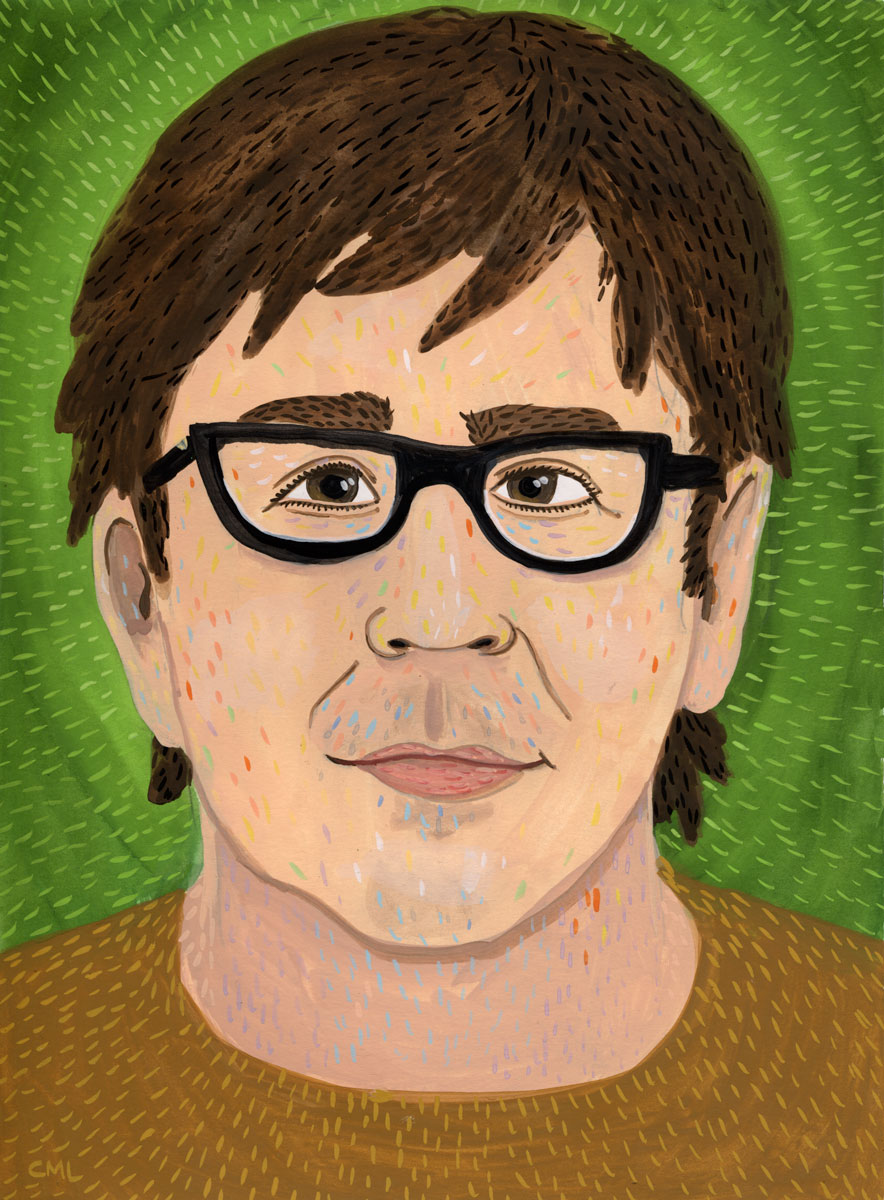
Monday, February 20th
International Harvester Reading
Mountain Goats lead singer John Darnielle’s debut novel, Wolf in White Van, was an incredibly affecting story of a wounded soul trying to come to terms with society. Darnielle’s second novel is about a video store clerk in 1990s Iowa who discovers a bizarre secret hidden on the films in his store.
Town Hall Seattle, 1119 8th Ave., 652-4255, http://townhallseattle.org. $5. All ages. 7:30 p.m.
Book News Roundup: "Leave Milo Alone!" edition
- Jseattle at Capitol Hill Seattle blog says that the Elliott Bay Book Company building is going up for sale:
“This offering represents a unique opportunity to invest in a 100% leased property with a stable retail income stream and future development potential located in one of Seattle’s hottest and growing neighborhoods,” the pitch from the Jones Lang LaSalle real estate firm concludes.
"An average of five people are kicked out of Seattle Public Libraries (SPL) each day," Nathalie Graham writes at the South Seattle Emerald. Her full report on SPL's anti-homeless policies is a must-read.
Shockingly, Milo Yiannopolous's agent, who recieves a portion of Yiannopolous's income as a writer, has written an editorial for Publishers Weekly titled "In Defense of Milo Yiannopoulos's Book." Thomas Flannery Jr writes:
When protesters try to silence Milo, when they show up to his events and physically threaten him, or scream and smear fake blood all over themselves, or riot and destroy property, they are using tactics I, as a self-described progressive, have always chided others for using. I won’t stand for it when religious groups try to silence transgender supporters, and I won’t stand for it when so-called progressives try to silence conservative voices.
Regarding the above quote: Flannery is confusing freedom of speech with a right to a platform. Just as Yiannopoulos has a right to speak, protesters have a right to protest him. And if Yiannopoulos threatens students, as he did in Miluaukee colleges have a right to not give him a platform. Remember, while Flannery whines about people raising their voices, it was a Yiannopoulos fan who shot a protester when Yiannopoulos spoke at the University of Washington. So who's doing the intimidating, here? And why should Publishers Weekly have given a platform to someone who is financially vested in Yiannopoulos's success? Maybe it's because Flannery is the only person in the publishing industry willing to stand up for his client?
Video footage of Marcel Proust has been discovered. If In Search of Lost Time was inspired by a cookie, imagine what Proust would have written in response to a clip of archival footage.
I was reading this blog that mocks old library books, and the most recent entry is a sexual health guide for youth written by Dr. Ruth Westheimer. The writer, Holly Hibner, writes, "The cover image attached features an endearing but very old lady who looks way too much like my grandma." The fact that young writers don't know who Dr. Ruth is makes me feel very, very old. One day, Hibner will probably be reading a post written by a young writer mocking one of Dan Savage's books. On that day, she might understand how I feel right now. That is all.
Most comics blogs only cover actual comics news less than a third of the time, Heidi MacDonald at The Beat discovered. The rest of the posts are about "toys, wrestling, video games and what I’d call 'related business news' like conventions, collectibles and human interest."
I loved reading this super-nerdy post tracking the changes of a minor-but-useful spell through the many editions of Dungeons & Dragons.
